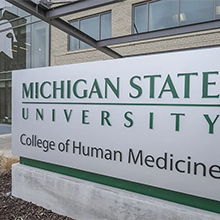News
Maji Hailemariam Debena is an assistant professor in the Department of Obstetrics, Gynecology and Reproductive Biology in the College of Human Medicine. Debena holds a Ph.D. in mental health epidemiology and a master’s degree in social work from Addis Ababa University in Ethiopia. She specializes in working with underserved populations including women, justice-involved individuals and individuals from low-resource settings in both Africa and the United States. Her research focuses on equitable access to mental health care in low-resource settings.
Sascha Drewlo, Ph.D., has been awarded the 2020 Jean P. Schultz Biomedical Research Endowment fund.
Dr. Drewlo is an associate professor in the Department of Obstetrics, Gynecology and Reproductive Biology at the Michigan State University College of Human Medicine. His research is focused on closing the gap between the diagnosis of placental dysfunction and its treatment to provide every pregnancy the best possible outcome. Drewlo seeks to develop novel approaches for fetal genetic analysis as well as overall pregnancy status during the first trimester of pregnancy from a simple pap smear.
In honor of Women in Medicine Month, the College of Human Medicine celebrates Ripla Arora, PhD, assistant professor, Department of Obstetrics, Gynecology and Reproductive Biology. Her research is focused on maternal-fetal interactions during pregnancy. She is the 2022 recipient of the Jean P. Schultz Biomedical Research Endowment Fund award.
Ripla Arora, PhDAround 75% of failed pregnancies occur due to problems with the embryo or the maternal environment. The uterus in particular plays a big role in pregnancies occurring through both natural conception and in vitro fertilization..
Patterns of gene expression—the degree to which genes are turned on or off—in uterine muscle tissue may help explain why fibroids disproportionately affect Black women, suggests a study supported by the National Institutes of Health. Understanding the factors that contribute to racial disparities in uterine fibroid disease can inform treatment and prevention approaches.



